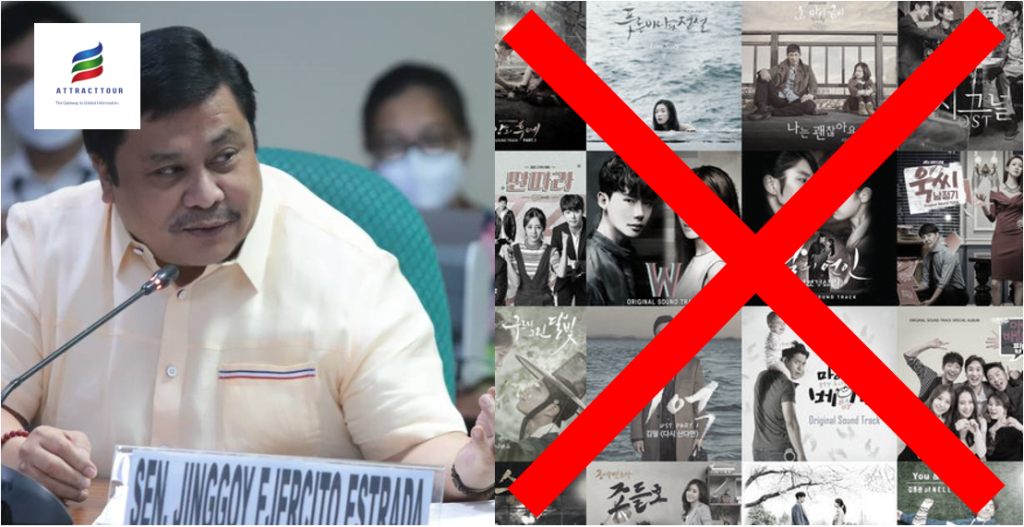Senator Jinggoy Estrada has stated that he is considering recommending a ban on Korean telenovelas in the country, emphasizing the importance of promoting Filipino-made shows instead.
“Ang aking obserbasyon pagpatuloy tayo nagpapalabas ng Korean telenovela, ang hinahangaan ng ating mga kababayan ay itong mga Koreano at nawawalan ng trabaho at kita yung ating mga artistang Pilipino,” Estrada said during a hearing on the Film Development Council of the Philippines’ planned 2023 budget on (FDCP).
(From what I’ve observed, we keep showing Korean telenovelas, our fellow countrymen idolize Koreans, and our Filipino artists are losing jobs.)

“Kaya minsan pumapasok sa aking isipan na i-ban na itong mga telenovela ng mga foreigners at dapat ang mga artista nating Pilipino talagang may angking galing sa pag-arte ay ‘yun naman dapat ang ipalabas natin sa sariling bansa natin,” he added.
(Sometimes it occurs to me that we should ban these foreign telenovelas and instead showcase talented Filipino artists in our own country.)
“Kung ang pino-promote natin ay mga produkto ng Koreano, kaya nagkakaroon tayo ng halos maraming produktong Korean dito sa atin imbis na i-promote natin yung sarili natin ang napro-promote natin yung mga banyaga,” he explained.
(If we’re promoting Korean products, that explains why there are so many of them here; instead of promoting our own, we’re promoting foreigners.)
During the same hearing, Senator Robin Padilla pushed for an increase in the tax on foreign series to help support the local film industry.

“Maari po bang taasan natin itong tax ng mga foreign series na pumapasok sa atin para kahit papaano po yung subsidiya nito bigay natin sa mga workers sa industriya natin, sa local, kung papaano po ginawa natin diyan sa rice tariffication, gawin nating foreign teleserye tariffication dahil marami pong nawawalan ng trabaho dito,”he stated.
(Could we raise the tax on these foreign series that are brought in, so that some of the subsidies can go to workers in the local industry, as we did with rice tariffication? Because so many people are losing jobs here, we can do foreign teleseries tariffication.)
Padilla was relating to a law that allows for unlimited rice imports as long as private-sector traders pay a 35% tariff on shipments from Southeast Asian neighbors.
“Ang hirap naman pong i-ban natin sila pero dapat po siguro maging patas lang po tayo kawawa po ang ating industriya,” he stated.
(It would be difficult to prohibit them, but perhaps we can level the playing field because our local industry is suffering.)
Tirso Cruz III, Chairman of the FDCP, agreed that there should be a balance in order to promote and protect local films.
He stated that one of the agency’s programs focuses on the development and promotion of local films.
“Ang isa pong pangunahing programa namin ay talagang mag-focus sa paggawa ng mga local films muna dahil sabi namin ang unang-una importante ay ang maniwala ang kapwa Pilipino sa pelikulang Pilipino,” said the FDCP chairman.
(One of our major programs focuses on the production of local films, because it is critical that Filipinos believe in Filipino cinema.)
“Kaya ang ginagawa naming focus ay sa local films dahil kung kami man po ay pupunta sa film festival ay gusto naming dala yung sariling atin na ilalaban natin sa competition na ipakikita natin sa mga festival na ang mga Pilipino ay mas matindi gumawa ng pelikula at madamdamin at mas maganda,” he added.
(We focus on local films because when we go to film festivals, we want to compete with our own films and show that Filipinos can make evocative and beautiful films.)





